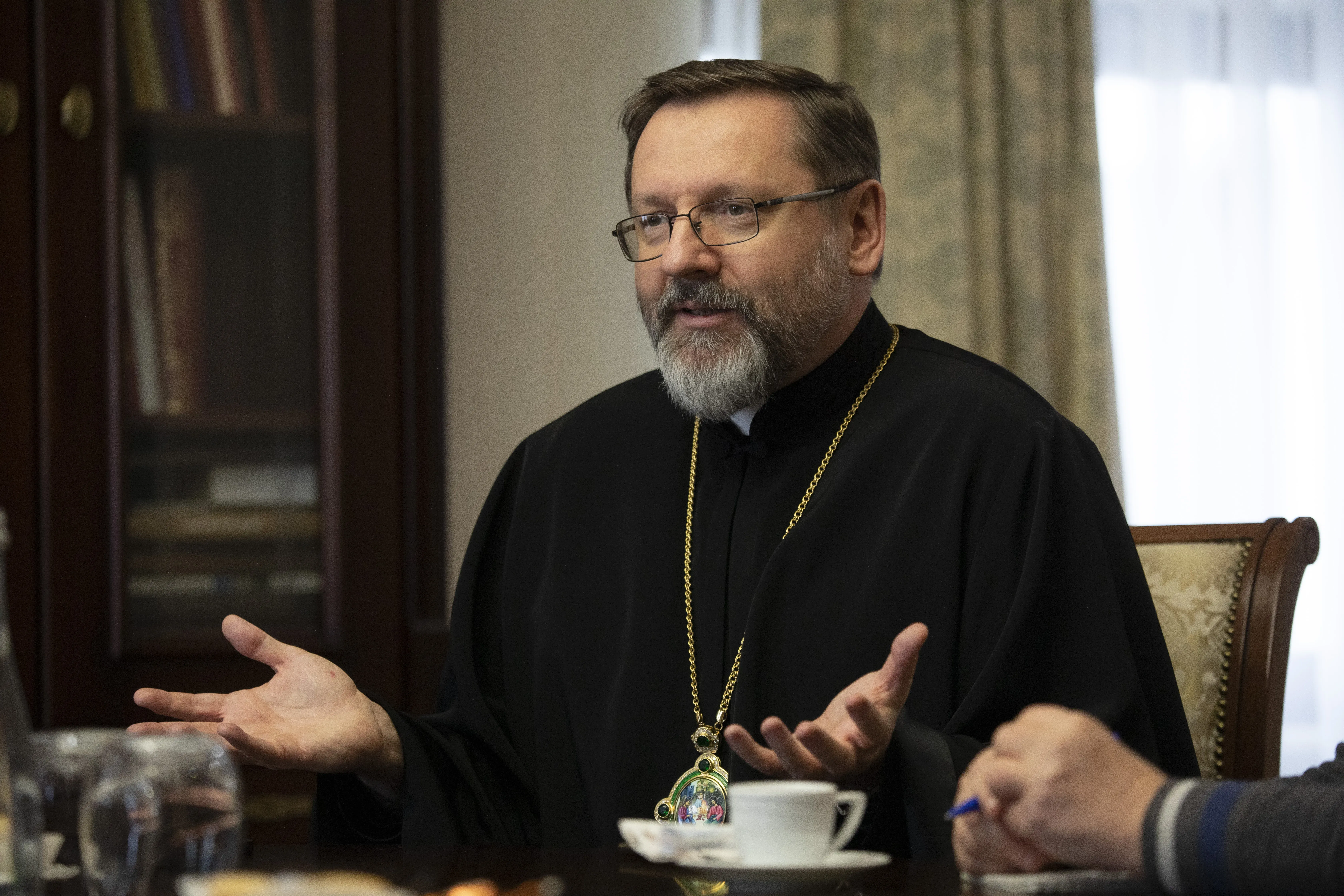“But we know that peace is something deeper than the absence of war,” Shevchuk added. “It is not just about winning in war, but winning the very spirit of war, the war in its causes, the source of authentic and lasting peace.”
In the meantime, for many people, an important means of support is provided by Church initiatives. The head of the Ukrainian Greek Catholic Church said that people looking for accommodation arrive in Kharkiv from the “martyr city” of Izium and Kupiansk. They receive a payment equivalent to $50-$80 from the government — not enough to pay for even the most urgent things. And Kherson, which has just been liberated, is still suffering, he said, and in need of aid.
There are two ways in which the Church provides aid — through Caritas and through the parishes, where family homes and various initiatives are provided. There is also a foundation of the patriarch, managed by the major archbishopric, which seeks to provide nutrition: The food parcels feed a family for a week and so are not dependent on spontaneous arrival of humanitarian aid, Shevchuk explained. “We try to procure this food in a stable way. Let’s just say it’s a bit of a ‘patriarch’s ambulance.’”
For Shevchuk, “peace means above all the absence of war, which for us means winning, getting the enemy to go away. Peace in our imagination means stopping these military actions. Stop killing us. That will be the first step towards authentic peace.”
“But we know that peace is something deeper than the absence of war,” Shevchuk added. “It is not just about winning in war, but winning the very spirit of war, the war in its causes, the source of authentic and lasting peace.”
(Story continues below)
In the meantime, for many people, an important means of support is provided by Church initiatives. The head of the Ukrainian Greek Catholic Church said that people looking for accommodation arrive in Kharkiv from the “martyr city” of Izium and Kupiansk. They receive a payment equivalent to $50-$80 from the government — not enough to pay for even the most urgent things. And Kherson, which has just been liberated, is still suffering, he said, and in need of aid.
There are two ways in which the Church provides aid — through Caritas and through the parishes, where family homes and various initiatives are provided. There is also a foundation of the patriarch, managed by the major archbishopric, which seeks to provide nutrition: The food parcels feed a family for a week and so are not dependent on spontaneous arrival of humanitarian aid, Shevchuk explained. “We try to procure this food in a stable way. Let’s just say it’s a bit of a ‘patriarch’s ambulance.’”
After the Russians left, they discovered the atrocities committed in Bucha, 15 miles from the capital.
The most potent weapon, Shevchuk said, is still resilience. Ukrainians go home; they don’t run away forever. And, when they’re in the area, they fix everything.
He told the journalists how his daily video message came about, which was more a way to certify his survival in the midst of war, but which then became a necessity for people.
“After three weeks, I wondered if it was worth continuing, then I went to Zytomir, which was also martyred every day. On a Saturday, 21 missiles fell on the city. There an old lady told me: ‘We are terrified, it is good that you talk to us. It doesn’t matter what you say, it matters that you talk to us. This reminded me of a situation I experienced as a doctor, because I had worked in an intensive care unit. I saw a dying man who said to his wife: Talk to me! And she began to read even though he could not follow.’ We don’t always have to carry super-intellectual messages and it is important to accompany these people. We cannot change the circumstances, we can change our way of life in a Christian way.”
It will be a difficult Christmas, but not like last Easter. “We have the custom of singing Christmas carols, which are part of our way of living Christmas sung by visiting neighbors and those who are most in need to bring and share joy and send good wishes,” Shevchuk said. “I also remember when these Christmas carols were a form of protest against the atheist regime: People sang because in this way they won violence, because the carols sing the event of the birth of Jesus Christ.”
“I know that many prepare to go to the front and sing these Christmas carols with our soldiers, making a semi-theatrical representation of the event applied to our existential situation.”
“We are forced to fight for our survival,” Shevchuk said, “and for us peace means healing the wounds of our people, because we are all wounded.”
Andrea Gagliarducci is an Italian journalist for Catholic News Agency and Vatican analyst for ACI Stampa. He is a contributor to the National Catholic Register.
 Major Archbishop Sviatoslav Shevchuk, leader of the Ukrainian Greek Catholic Church, speaking to journalists on Dec. 9, 2022. Oleksandr Sawranskij / Major Archbishopric of the Ukrainian Greek Catholic Church
Major Archbishop Sviatoslav Shevchuk, leader of the Ukrainian Greek Catholic Church, speaking to journalists on Dec. 9, 2022. Oleksandr Sawranskij / Major Archbishopric of the Ukrainian Greek Catholic Church




 Andrea Gagliarducci listening to Major Archbishop Sviatoslav Shevchuk, leader of the Ukrainian Greek Catholic Church, on Dec. 9, 2022. Oleksandr Sawranskij / Major Archbishopric of the Ukrainian Greek Catholic Church
Andrea Gagliarducci listening to Major Archbishop Sviatoslav Shevchuk, leader of the Ukrainian Greek Catholic Church, on Dec. 9, 2022. Oleksandr Sawranskij / Major Archbishopric of the Ukrainian Greek Catholic Church


